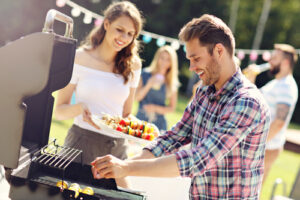 Whenever you are dealing with open flames and a large source of fuel, you need to take extra care—and grilling is no exception.
Whenever you are dealing with open flames and a large source of fuel, you need to take extra care—and grilling is no exception.Every year, over 10,600 home fires are caused by grills, according to the National Fire Protection Association. July is the peak month, followed by June, May, and August. In addition, 19,700 patients went to the ER due to grill-related injuries. About half were thermal burns.
So, before you toss a few patties on the grill and pop a cold one, make sure you’re up to speed on these grilling safety guidelines.
Checking for gas leaks and other issues. It’s ideal to do this before grilling. If you haven’t broken the grill out for the season, do a quick check for bird or rodent nests, or leaves that may have fallen inside. After the gas has been turned on, spray on a mixture of soap and water on the hose, regulator, and burner connections. If any bubbles form, it’s an indication of a leak. Turn the gas off and address the leak before grilling. (The National Fire Protection Association has a video on how to check for gas leaks here.)
Turning it on. Don’t light the grill with the cover closed. Otherwise, gas could buildup, causing a fireball when you open it again.
Don’t grill in the garage. The grill needs to be outside, not in a garage or other enclosed space, such as a gazebo.
Follow the rule of three. Your grill should be at least three feet away from your house and any other structure, like a garage or shed. One home advice site even recommends a 10-foot buffer. If you have room for that, why not err on the side of safety? Likewise, you should make sure there are no objects within three feet of the grill—no baskets, beach balls, stacks of wood, overhanging branches, desk rails, or anything else flammable. Yes, that means pets and kids should be at a three-foot distance too.
Don’t leave it unattended. This isn’t just to ensure there isn’t a problem with the grill itself. You also need to stay by the grill to enforce that three-foot safety zone for kids and pets.
Be prepared for the worst-case scenario. Keeping a water spray bottle on hand will be helpful for small flare-ups. But don’t use it for grease fires, since that will just spread the grease. Instead, use baking soda. As a backup measure, have a fire extinguisher on hand. If you don’t know how to use it, learn how beforehand.
Turning it off. After doing all of the above, make sure you don’t forgot one of the most important steps—turning the grill off when you’re done using it. Leaving the grill on, unattended is an obvious fire hazard that is entirely avoidable.
Clean it. Cleaning your grill prevents a dangerous building up of grease that could cause a flare-up. A clean grill will also produce better-tasting food. Ideally, you should clean the grill right after you’re done using it.
For more tips specifically for propane and charcoal grills, see this infographic.
Sources: The U.S. Fire Safety Administration, the National Fire Protection Association, and a Taste of Home.





